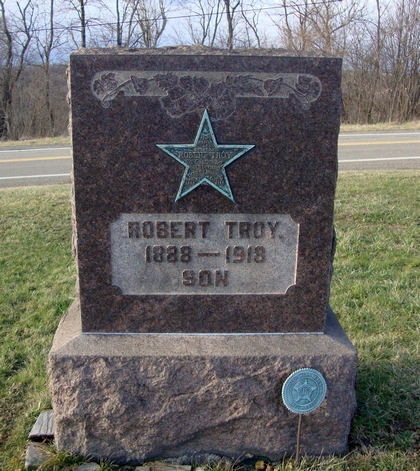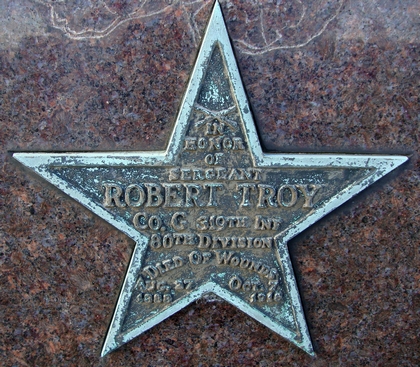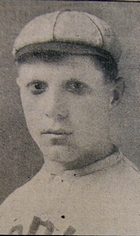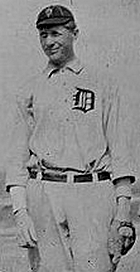Robert Troy
| Date and Place of Birth: | August 27, 1888 Wurzach, Germany |
| Date and Place of Death: | October 7, 1918 Evacuation Hospital 8, Petit Maujouy, France |
| Baseball Experience: | Major League |
| Position: | Pitcher |
| Rank: | Sergeant |
| Military Unit: | 80th Division, US Army |
| Area Served: | France |
Robert Troy was born in Germany and made just one appearance in the major leagues in 1912. Six years later he was on the battlefields of France, fighting against the people from the country of his birth.
Robert G. “Bun” Troy, the son of Mr. and Mrs. August Troy, was born
on August 27, 1888 in Wurzach (now Bad Wurzach), a small town in
southern Germany. He grew up in McDonald, Pennsylvania, about 20 miles
southwest of Pittsburgh. Pitching for the Knoxville County team in 1909,
Troy had a tryout with the Philadelphia Phillies at the end of the
season and was signed in October. For 1910, he was sent to the Johnstown
Johnnies of the Class B Tri-State League but, despite winning his only
game, he was released. "He had the speed and curves," explained the
Sporting Life, "but lacked control, and acted too much like an amateur
on the ball field."
He returned to the Knoxville team before signing later in the year with the
McKeesport Tubers of the Class C Ohio-Pennsylvania League.
At 6-foot-4, and probably the tallest player in the league, Troy had an
unmemorable rookie campaign with the Tubers; in 17 games he had 6 wins
against 8 losses. McKeesport didn’t field a team for 1911 and Troy,
together with six other players, was sold to the Wheeling Stogies of the
Class B Central League. He didn’t stay long in Wheeling and returned to
the Ohio-Pennsylvania League with the Steubenville Stubs for a second
forgettable season. In 20 appearances he again had 6 wins but this time
suffered 11 defeats.
In 1912, 23-year-old Troy joined the Adrian Lions of the Class D
Southern Michigan League and truly showed his ability as a pitcher. In
43 games he led the league with a 23-14 record (he also led the league
with 268 strikeouts), helping the Lions clinch the league title. Detroit
Tigers’ owner Frank Navin, who hailed from Adrian, had been keeping an
eye on Troy and when the Lions’ season ended he bought Troy’s contract
and called him up to Detroit.
On September 15, 1912, Robert Troy made his one and only major league
appearance, starting for the Tigers against Washington. A good crowd was
on hand at Detroit’s Navin Field that afternoon to see the great Walter
Johnson of Washington whose record 16-game winning streak had been
snapped a few days earlier. With 25-year-old Ty Cobb in centerfield for
the Tigers, Troy matched Johnson pitch-for-pitch and shutout the
Senators for six innings, protecting a 3-0 lead. But in the seventh
inning he got in trouble. Against Troy and Ed Willett – helped by some
sloppy fielding - six runs were put across before the inning was over
and the game was called after eight innings because of darkness with the
Senators up, 6-3 (Cobb, who batted .409 that season, was 0-for-3 on the
day).
Hugely disappointed with losing his first big league start, attributing
much of the blame to poor support during crucial innings, he jumped the
team and returned home to McDonald.
Troy was assigned to the Chattanooga Lookouts of the Southern
Association for 1913, who, in turn returned him to Adrian in the
Southern Michigan League, where he enjoyed another outstanding season.
Again he won 23 games in 43 appearances as the Lions finished in second
place behind the Battle Creek Crickets.
In 1914, the 25-year-old was with the Pittsfield Electrics of the Class
B Eastern Association where he was 19-13 in 36 games, leading the league
with 212 strikeouts. That was Troy’s last full season in organized baseball.
He signed with Pittsfield for 1915, but the league didn’t make it to
opening day, although he did make one appearance with the Troy Trojans
of the Class B New York State League, earning a win on May 18. There are reports of Troy
then pitching semi-pro baseball for
Worcester, Johnstown, Canonsburg and McKeesport during 1915 and 1916.
By 1917, Troy was in military service. As an army sergeant with the 80th
Division he served in France, fighting against men from the country of
his birth. He was fatally shot in the chest on the battlefield during
the Meuse Argonne campaign. He died on October 7, 1918 at Evacuation
Hospital Eight, a mobile hospital which, at the time was located in an
area referred to as Petit Maujouy, midway between the hamlets of
Ancemont and Senoncourt, six miles southeast of Verdun.
Sergeant Robert Troy was buried in France but his body was returned to
the United States in 1921. Together with the remains of two other
soldiers, he arrived in Monessen, Pennsylvania on August 5 and was
transported to McDonald where his funeral was held at the First
Presbyterian Church, followed by burial at Robinson's Run Cemetery in
McDonald.

Bun Troy's grave at Robinson's Run Cemetery in McDonald, Pennsylvania

A close up of the inscription included on Bun Troy's grave
Sources
Sporting Life Oct 2, 1909
New Castle News June 3, 1910
Sporting Life June 4, 1910
Fort Wayne Sentinel Feb 1, 1911
Salt Lake Tribune Sept 16, 1912
Fort Wayne Sentinel Sept 25, 1912
Fort Wayne Journal Gazette May 17, 1913
Syracuse Daily Journal March 15, 1915
Coshocton Daily Tribune June 2, 1916
Coshocton Daily Tribune June 10, 1916
Monessen Daily Independent Aug 6, 1921
Date Added July 13, 2012 Updated October 13, 2021
Baseball's Greatest Sacrifice is associated with Baseball Almanac
Baseball's Greatest Sacrifice is proud to be sponsored by



